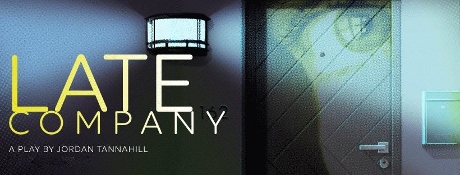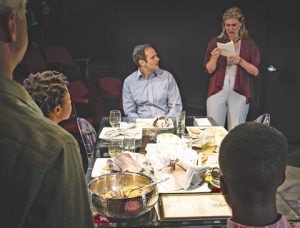IT GETS WORSE TOO
Teenage suicide due to cyberbullying deserves its storytelling: In just 70 minutes, Canadian playwright Jordan Tannahill’s Late Company seems to cover the bases in a gamut of reactions. Like the Netflix series 13 Reasons Why, it probes self-murder from all sides, inevitably making for a very painful play. Rich or rancid with survivor guilt, blaming the victims, lost opportunities, defensive denial, and unconditional heartbreak, Cor Theatre’s Midwest premiere of this agonized one-act, now at Chicago’s Pride Arts Center, is the proverbial dinner party from hell.
 The odd occasion of this ferocious feast is a pre-arranged meeting’”or confrontation’”between two sets of parents and the high school kid supposedly responsible for the son’s suicide. It’s Chicago’s North Shore, a year after gay 16-year-old Joel slit his wrists and bled to death in the family bathtub. His parents’”Michael, a conservative politician (Paul Fagen) and his sculptress mother Debora (Tosha Fowler)’”are entertaining Bill (Tony Bozzuto) and Tamara (Asia Jackson) and their teenage son Curtis (Matthew Elam). And they have an agenda.
The odd occasion of this ferocious feast is a pre-arranged meeting’”or confrontation’”between two sets of parents and the high school kid supposedly responsible for the son’s suicide. It’s Chicago’s North Shore, a year after gay 16-year-old Joel slit his wrists and bled to death in the family bathtub. His parents’”Michael, a conservative politician (Paul Fagen) and his sculptress mother Debora (Tosha Fowler)’”are entertaining Bill (Tony Bozzuto) and Tamara (Asia Jackson) and their teenage son Curtis (Matthew Elam). And they have an agenda.
Michael, ever the arbitrator, may draw back but, galvanized by grief, Debora is after justice, not “closure” or coping. She needs to know why popular Curtis and his cruel crowd harassed their late Joel with vicious posts on Facebook and YouTube and smeared feces on his locker. In effect, persuading him that it doesn’t get better, these vicious punks drove Joel to cut himself, intermittently and then permanently. Debora reads a letter that she’s written to Curtis. Curtis reads his prepared response. Joel, of course, is silent but that speaks too.
In a heartbreaking scene Debora, still reeling from unprocessed aftershocks, shows her guests photos and awards that Joel lost. She tells of hearing strange sounds in the night and awakening from searing nightmares. Debora finally launches into her most wrenching “share”’”a litany of all the things she won’t get to see and share with her lost Joel. It’s every mother’s unfixable calamity.
Of course, true tragedy is never one-sided. For Curtis and his protective parents “loss is loss,” “a lot of people let Joel down,” and Debora’s sorrow is far from unique. Moreover, Joel played a hand in his demise by not being tough enough (not “standing his ground”). Why did he “flaunt” his homosexuality in dress-up/make-up videos (that Debora never knew about)? Was he, well, asking for it?
As it is, this closet case never “came out” and, too predictably, the school did nothing to stop abuse that Joel worked desperately to conceal. As Joel’s parents maximize his homosexuality to indict their son’s killer, Curtis’s defenders minimize it, though enabler Bill isn’t afraid to smack Curtis for alleged insubordination. (We needn’t guess how Curtis learned to “pass it on” to Joel.)
As recriminations burst from grievances, the question’”Is forgiveness possible?’”becomes more and more moot. Common ground eludes these decent folks. Their impasse stands for many more souls than four parents and one son.
Caught in the crossfire of a healing turned hurtful, Curtis seems to conceal his connection. All we know for sure is that Curtis and his mean posse found it “funny” to taunt Joel, never imagining he’d take it into eternity.
To its credit Late Company’”and Jessica Fisch’s kinetic staging’”are emotionally and morally balanced, no small feat with so polarizing a premise. The dinner setup may seem a stretch but, justifying it with tensile sincerity, Fagen, Fowler, Bozzuto, Jackson and Elam focus like lasers on their characters’ strengths and weaknesses. And, as an audience does with strong, true plays, we’re there too, wondering what differences we could’”or still can’”make.
photos by Matthew Gregory Hollis
Late Company
Cor Theater
The Buena (Pride Arts Center), 4147 N. Broadway St.
Thurs-Sat at 8; Sun at 3; select Wed’s at 8
ends on July 16, 2017
for tickets, call 866.811.4111 or visit Cort





